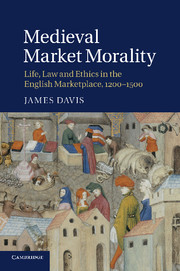3 - The behaviour of market traders
Published online by Cambridge University Press: 05 December 2011
Summary
The influences of literary and legal proclamations upon everyday medieval practices were not necessarily direct or straightforward. Indeed, petty traders may have ignored elements of law and moral strictures when possible, while courts and jurors were arguably flexible in their use of regulations, depending on the parties involved and social norms. Legal codifications and moral writings are therefore insufficient evidence for actual trading practices and need to be supplemented by sources of local administration. As Britnell stated, ‘behind the verbiage of urban court rolls lies a rich variety of interplay between law and social values’. Were traders really regarded by local officials as generally dishonest and in need of constant monitoring? Were there notable discrepancies between literary and legislative ideals of trade and its actual regulation in a medieval community? This chapter surveys the day-to-day operations of town markets and their traders. In doing so, it is necessary to occasionally step back from the minutiae of regulations and credit transactions and regard the general picture. What were the rationales behind the management of markets and trade? Were there more informal means of regulation that were beneficial to traders, consumers and market efficiency?
In order to look further at the behaviour of market traders, the implementation of commercial regulation and the ethical framework within which markets operated, this chapter will look at court roll evidence from three markets in late medieval Suffolk: the two small market towns of Newmarket and Clare and the larger borough of Ipswich. This can only give us a glimpse into the activities of the medieval market, since the study is concentrated on both one small region of the country and a relatively short time period in the late fourteenth and fifteenth centuries. Nevertheless, such a focused and detailed comparison can perhaps give a better insight into the influence of moral values and regulation upon the behaviour of medieval market traders.
- Type
- Chapter
- Information
- Medieval Market MoralityLife, Law and Ethics in the English Marketplace, 1200–1500, pp. 274 - 409Publisher: Cambridge University PressPrint publication year: 2011



